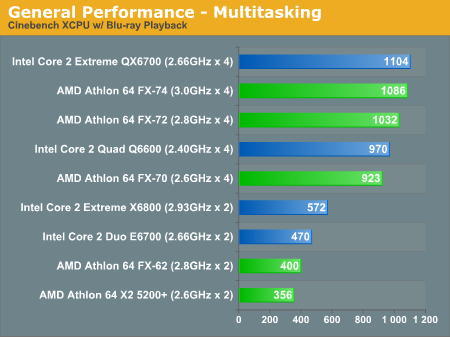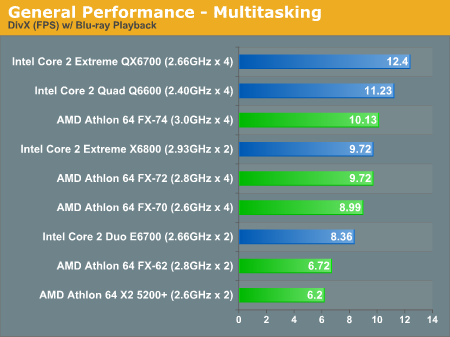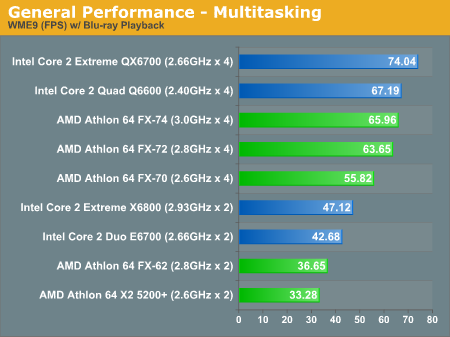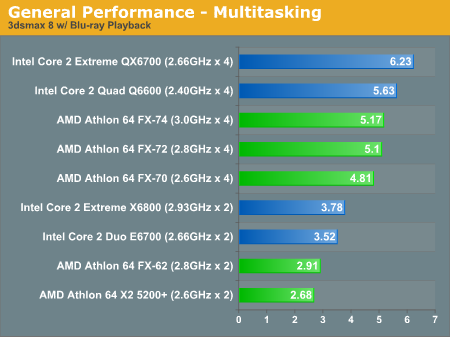AMD's Quad FX: Technically Quad Core
by Anand Lal Shimpi on November 30, 2006 1:16 PM EST- Posted in
- CPUs
Multitasking Performance
When we were trying to think up new multitasking benchmarks to truly stress Kentsfield and Quad FX platforms we kept running into these interesting but fairly out-there scenarios that did a great job of stressing our test beds, but a terrible job and making a case for how you could use quad-core today.
Without a doubt, in the next two years the number of applications that see a benefit when running on four cores will increase dramatically. Even multitasking under Windows Vista will make the argument for more cores easier (simply opening a new Explorer window in Vista will eat up 10% of the CPU time of a Quad FX system), but our Vista benchmarks are not yet complete and we wanted to have something to showcase for this review.
While working on our Quad FX article we also happened to be working on a follow-up to our HDCP Graphics Card Roundup, focusing on H.264 decoding performance in Blu-ray titles. A light bulb went off and we had our benchmark: how many cores do you need to watch a high bit-rate Blu-ray movie and do something else at the same time on your PC?
The movie we used was Xmen III, encoded in H.264, and featuring bitrates in excess of 40Mbps at times. Our benchmark starts at the beginning of Chapter 18 and continues until our background tasks are complete. This particular segment ranges in bitrate from 13Mbps up to above 40Mbps, with the average falling in the 18 - 24Mbps range.
We played the movie in the foreground, while in the background we either ran our Cinebench test, encoded a DivX movie, encoded a WME9 movie or performed our 3dsmax test.
The two rendering tests are important because rendering can take a bit of time and it might be nice to entertain yourself with a movie while your rendering completes; after all, what's the point of having $1000 worth of CPUs if you can't use them for entertainment?
The two encoding tests are also important because being able to encode and decode at the same time is a fundamental requirement for a DVR, and at some point the next-generation of media center PCs will need to be able to decode high bitrate HD movies while encoding others. We chose to include both DivX and WME because DivX runs much better on Intel CPUs, while the standings are a bit closer under WME, to give you a better overall impression of how the two platforms handle these heavy multitasking scenarios.
Our first test involved us playing back the BD title while running our multi-threaded Cinebench test; we reported the Cinebench score upon its completion:

The dual core processors all fall to the bottom of the list and basically perform like single-core CPUs while decoding the Blu-ray movie. The quad-core setups do much better and perform very well, but all of the CPUs in this test were able to run without dropping any frames in the BD movie.
Making things a bit more difficult, our next test had the same movie playing back but this time we ran our DivX encoding test in the background. We reported the DivX encoding frame rate upon completion:

Performance is pretty much what you'd expect, although Intel's superior DivX encoding performance results in the Core 2 Extreme X6800 doing almost as well as the FX-74. What you don't see however is how well these systems played back the Blu-ray movie; none of the dual core setups were able to play the BD movie smoothly, not even the Core 2 Extreme X6800. The movie was basically unwatchable due to all of the pausing and stuttering.
All of the four core systems played the BD movie fairly well; although they all dropped some frames, it wasn't enough to totally ruin the experience.
Next up we tried playing our BD title while running our WME9 test, and found similar results:

Once again, none of the dual core platforms were able to play the BD title even remotely smoothly. The quad-core setups were able to play the movie while encoding, but still managed to drop some frames (not enough to ruin the experience though).
Our final multitasking test has us playing the same BD title while running our 3dsmax 8 render test:

Much to our disappointment, none of the systems could handle this workload without ruining the movie playback; even the quad-core setups had troubles. We're not talking a few dropped frames, but rather the movie playback would be completely stopped at times. It looks like we may have a scenario for either more GPU assisted H.264 decode or an 8-core Quad FX platform in the future.










88 Comments
View All Comments
JarredWalton - Thursday, November 30, 2006 - link
Why is it that just putting the other 2 cores on the same package reduces power consumption so much?It doesn't. Core 2 Duo uses less power than Athlon FX-62, so two of them are going to use less than two FX-62 (or whatever) chips. Now, adding the second socket also adds additional voltage regulation circuitry, so the second socket will increase the power load, but I don't think the second socket accounts for more than a 20W power increase, and probably more like 10W.
Slaimus - Thursday, November 30, 2006 - link
The odd thing for this platform is that the single CPU is actually really cheap versus comparable products. If only server boards can take these CPUs.Beachboy - Thursday, November 30, 2006 - link
I wonder how many diehard AMD enthusiats will want to split a set of these "quads".mino - Friday, December 1, 2006 - link
Count me in!IMHO enthusiast forums are will be full of guys sharing the CPU purchase... :)
peternelson - Friday, December 1, 2006 - link
Very likely eg I would and thought of that, knowing the guys on forums I frequent ;-)The other option is just buy two motherboard/systems and put each of the paired cpus into each one.
rqle - Thursday, November 30, 2006 - link
Best case scenario.100% price reduction in mainboard
Assume these FX cpu perform as well as QCore
Price it Similar to Performance
Major Power Reduction
Assume it a windows error =/ , no clue why you would run server software and e-commerce over softwares/games on this platform
I still have a very hard time recommended this setup to an enthusiast. Already have a hard time reaching 3.0ghz, it going to have a very hard time going just 10% beyond that. The upper limit of AMD cpu doesn’t impress me right now. Cheapo Intel Core 2, with an overclocker in mind seem to have more potential.
photoguy99 - Thursday, November 30, 2006 - link
I generally agree with your logic -But even your best case scenario is impossible because two 90 process CPUs have never come close to the power comsumption of a single 65 process CPU at the same performance.
mino - Friday, December 1, 2006 - link
Depends. EE X2's are more efficient than C2D's. Even performance wise.Not even comparing IDLE C'n'Q and EIST enabled ....
Anonymous Freak - Thursday, November 30, 2006 - link
Of course they'll sell more FX processors now than before. There was literally nothing to differentiate them before, other than clock speed. That, plus now they'll sell two for every computer built with them.But, I have a feeling that the FX processors are going to be even more niche than they were before. Before, it was at least a high end normal processor. Someone could buy a midrange system, and upgrade to an FX later. Now, you have to decide up front that you're going to pay a fortune for the computer. Presently, I have an el-cheapo $99 motherboard that I put my old Pentium 4 in. If I want, I can slap a Quad-Core Core 2 Extreme in there. I can't do that with AMD's setup.
I'm not an Intel fanboy, either. The only reason I even have the Pentium 4 is because a friend gave it to me free when he upgraded his system. I was perfectly happy with my laptop and my AthlonXP 1700+. But a free 3.8 GHz processor is a free 3.8 GHz processor. I went and bought the cheapest motherboard and memory I could find. Spent about $200, and I can upgrade to quad core anytime I want. (Although I'll probably upgrade from the onboard video to a decent PCI-E card first.)
photoguy99 - Thursday, November 30, 2006 - link
I don't know man, why would they sell any more?
To sell more someone would have to buy this "Ford Excursion" of a system. But who is going to buy this?
What boutique shop is going to even sell it?
Is there one single person here who is planning to get one?